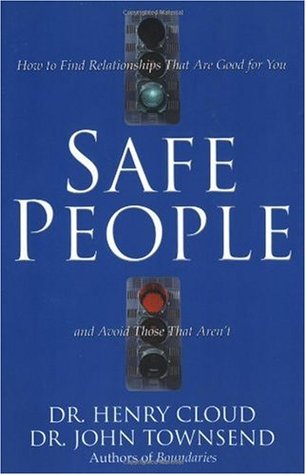Vicki Garza's Reviews > Safe People: How to Find Relationships That Are Good for You and Avoid Those That Aren't
Safe People: How to Find Relationships That Are Good for You and Avoid Those That Aren't
by

by

This book was eye-opening to me. I never understood my need for isolation, why I chose friends who weren't good for me, etc. After reading this book, I understand why God created community and how important it is to have safe people in my life who are God-given, loving and accepting. I highly recommend this book to anyone who has struggled with the need to be self-sufficient and isolated.
Sign into Goodreads to see if any of your friends have read
Safe People.
Sign In »
Reading Progress
Started Reading
August 4, 2008
–
Finished Reading
August 7, 2008
– Shelved
Comments Showing 1-2 of 2 (2 new)
date newest »
newest »
 newest »
newest »
message 1:
by
Elisa Garza
(new)
Aug 07, 2008 07:29PM
 So, why do you have a need for isolation and why do you choose friends who aren't good for you???
So, why do you have a need for isolation and why do you choose friends who aren't good for you???
reply
|
flag
 The reason I choose friends who aren't good for me? There are a host of possibilities. From the ones listed, I think I am a bad judge of character and am more drawn to how someone makes me feel than to whether or not they are a person of character. (pg. 95)
The reason I choose friends who aren't good for me? There are a host of possibilities. From the ones listed, I think I am a bad judge of character and am more drawn to how someone makes me feel than to whether or not they are a person of character. (pg. 95)I also think I have a need to rescue. "Because a rescuer needs an unsafe person to rescue, rescuing always leads to unsafe people in one's life" (pg 102).
The reason I have a need for isolation is more complicated. Page 71 really struck me (and your dad). We believe our bonding process was disrupted in one of the following ways:
Detachment: Someone being emotionally inaccesible to us.
Abandonment: Someone connecting, then leaving.
Inconsistency: Someone being unstable as a love object
Criticism: Unloving attacks upon our needy aspects
Abuse: Violations of our soul that destroy trust.
This leads a person to seek false solutions in the following ways:
Doing the same (not learning from our pain and disappointment)
Doing the opposite (reacting in an immature and irresponsible way)
Doing too much (staying overly busy in activities to numb pain)
Doing nothing (this occurs when you've been abandoned or punished for taking initiative) I think this is where I am now!
Doing for others (always wanting to help a struggler)
Doing cosmetic personality surgery (making external changes)
Doing without (this is a place of quiet despair) (pp 111-122)
Hope this helps. This book would be really good for everyone in our family to read, since we see the generational tendencies.


